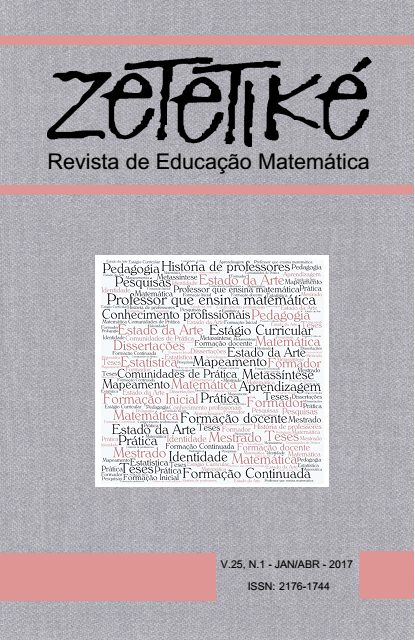Abstract
In this paper we describe and analyze the professional identity (PI) of teachers who teach mathematics (TTM)
existing in 15 brazilian dissertations and theses, of an initial corpus of 858, defended in programs of postgraduation strict sensu in the period 2001-2012.These studies highlight a diversity of theoretical approaches,
objectives and results on the theme, which we associate with their respective focal points, namely: the working
conditions of TTM, public policies directed to Basic Education, differentiated proposals of teacher education,
the prospective education of TTM and pedagogical practices, the education of TTM in the distance education
modality, and those in which the TTM took a secondary approach. We believe that the professional identity
presents itself as a promising and representative field for researching TTM education area and that the results of
new research can foster the definition of public policies for the TTM education.
References
Bauman, Z. (2001). Modernidade Líquida. Rio de Janeiro: Jorge Zahar.
Bauman, Z. (2005). Identidade. Rio de Janeiro: Jorge Zahar.
Beijaard, D., Meijer, P.C., & Verloop, N. (2004). Reconsidering research on teachers’ professional identity. Teaching and Teacher Education, 20 (1), 107-128.
Bennison, A. (2015). Developing an analytic lens for investigating identity as an embedder-of-numeracy. Mathematics Education Research Journal, 27(1), 1-19.
Brown, T., & McNamara, O. (2011). Becoming a mathematics teacher: identity and identifications. New York: Springer.
Brown, T., Heywood, D., Solomon, Y., & Zagorianakos, A. (2013). Experiencing the space we share: rethinking subjectivity and objectivity. ZDM Mathematics Education, 45(04), 561-572.
Cyrino, M.C.C.T. (2015). Desenvolvimento da identidade profissional de professores em comunidades de prática: elementos da prática. In: Anais do VI Seminário Internacional de Pesquisa em Educação Matemática - SIPEM 2015. Pirenópolis: SBEM, v. 1. p. 1-11.
Cyrino, M.C.C.T. (2016a, abril). Mathematics teachers’ professional identity development in communities of practice: reifications of proportional reasoning teaching. BOLEMA, 30(54) 165-187.
Cyrino, M.C.C.T. (2016b). Potencialidades da exploração de um caso multimídia como elemento da prática na formação inicial de professores de Matemática. Educação Matemática em Revista, 39(b), 80-89.
Cyrino, M.C.C.T.(2016c).Teacher professional identity construction in pre-service mathematics teacher education: analysing a multimedia case. Proceedings of the 13th International Congress on Mathematical Education. Hamburg: ICME 13.
Dubar, C. (2005). A socialização: construção das identidades sociais e profissionais. São Paulo: Martins Fontes.
Dubar, C. (2006). A crise das identidades: a interpretação de uma mutação. São Paulo: Afrontamento.
Fiorentini, D. (2008). A pesquisa e as práticas de formação de professores de matemática em face das políticas públicas no Brasil. Bolema, 21(29), 43-70.
Ginzburg, C. (1989). Mitos, emblemas, sinais. São Paulo: Companhia das Letras.
Goos, M. (2005). A sociocultural analysis of the development of pre-service and beginning teachers’ pedagogical identities as users of technology. Journal of Mathematics Teacher Education, 8(01), 35-59.
Goos, M., & Bennison, A. (2008). Developing a communal identity as beginning teachers of mathematics: Emergence of an online community of practice. Journal of Mathematics Teacher Education, 11(01), 41–60.
Guimarães, V.S. (2006). Formação de professores: saberes, identidade e profissão (3a ed.). Campinas, SP: Papirus.
Hall, S. (2006). A identidade cultural na pós-modernidade (11a ed.). Rio de Janeiro: DP&A.
Hossin, S., Mendrick, H., & Adler, J. (2013). Troubling “understanding mathematics in-depth”: Its role in the identity work of student-teachers in England. Educational Studies in Mathematics, 84(02), 32-48.
Kelchtermans, G. (2009): Who I am in how I teach is the message: self‐understanding, vulnerability and reflection. Teachers and teaching: theory and practice, 15(2), 257-272.
Lloyd, G. M. (2006). Preservice teachers’ stories of mathematics classrooms: Explorations of practice through fictional accounts. Educational Studies in Mathematics, 63(1), 57-87.
Losano, L.; Cyrino, M. C. C. T. (2017). Current research on prospective secondary mathematics teachers’ professional identity. In M. E. Strutchens, R. Huang; L. Losano, D. Potari, M. C. C. T. Cyrino, J. P. Ponte, R. M. Zbiek (Eds), The mathematics education of prospective secondary teachers around the world (pp.25-32). New York: Springer.
Oliveira, H. (2004). Percursos de identidade do professor de Matemática em início de carreira: o contributo da formação inicial. Quadrante, 13(1), 115-145.
Pamplona, A. S., & Carvalho, D. L. de. (2009). Comunidades de prática e conflitos de identidade na formação do professor de matemática que ensina estatística. In D. Fiorentini, R. C. Grando, & R. G. S. Miskulin (Eds.), Práticas de formação e de pesquisa de professores que ensinam Matemática (pp. 211-232). Campinas: Mercado de Letras.
Ponte, J. P., & Chapman, O. (2008). Preservice mathematics teachers’ knowledge and development. In L. D. English (Ed.), Handbook of international research in mathematics education: Directions for the 21st century (2nd ed., pp. 225-263). New York: Routledge.
Teixeira, B. R., & Cyrino, M. C. D. C. T. (2015). Desenvolvimento da identidade profissional de futuros professores de matemática no âmbito da orientação de Estágio. Bolema, 29(52), 658-680.
Ticknor, C. (2012). Situated learning in an abstract algebra classroom. Educational Studies in Mathematics, 81(04), 307-323.
Van Putten, S., Stols, G., Howie, S. (2014). Do prospective mathematics teachers teach who they say they are? Journal of Mathematics Teacher Education, 17(03), 1-24.

This work is licensed under a Creative Commons Attribution-NonCommercial-NoDerivatives 4.0 International License.
Copyright (c) 2017 Zetetike

